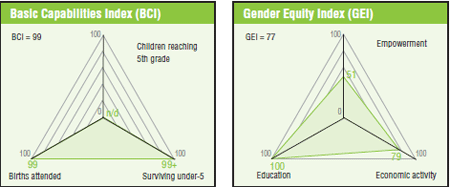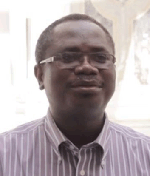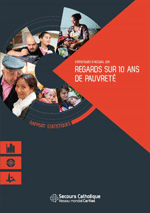France
ATD Fourth World focuses its efforts on the most disadvantaged populations
Published on Tue, 2018-11-06 00:00
In France, a High Level Steering Committee for the implementation of the SDGs held its first meeting in April 2018 as a forum to debate and collectively build, with public and private actors, a ‘roadmap’ to be issued in the fall of 2019.This move was applauded by the ATD Fourth World Movement for being inclusive, but also criticized as “coming late”. ATD Fourth World finds “very little effort to synergize the various objectives, and "not a major concern" for poverty in France. The Movement hopes “that the enforcement of each SDG reaches the poorest, on the national territory as well as in the international development cooperation by France” and it campaigns in particular on the issue of unemployment (currently 9 percent in France) demanding “access to work as a right, just as the right to education or the right to social security”. |
Published on Mon, 2017-07-17 18:27
The SDGs are not a matter of developing countries that would only concern France in its external relations. They also impact French domestic policies. The targets that risk not being met reflect the fact that they are not first and foremost issues related to environmental protection in the French context; instead, half of the targets that will be difficult to reach concern economic and social issues such as employment, poverty, educational inequalities, gender equality and official development assistance (ODA). |
Published on Wed, 2017-04-19 18:16
All major presidential candidates promise in their platforms to increase the French development cooperation contribution to 0.7 per cent of GDP and yet "I bet you a bottle of champagne that whoever gets elected, when we gather again five years from now that promise will not have been met". Jean-Michel Severino, the author of the bet, was speaking on behalf of Emmanuel Macron in a public debate about French international relations and development cooperation among representatives from the five leading presidential candidates, a contest so close that four of them are deemed likely to pass to the second and final round next May. |
Published on Fri, 2016-08-05 12:10
Can France be labeled as “developed” when 8 percent of the population lives in poverty and its mode of consumption and production are depleting the resources of the planet? Countries should not be rated only by GDP but also by their environmental sustainability and access to human rights for all of their citizens. Even though France is the world's sixth largest economy, poverty is widespread in the country and extreme poverty is persistent. Many people have to endure the violence of poverty and inequalities weaken social cohesion and democracy. Regarding international responsibility, France's contribution to Official Development Assistance (ODA) is actually far from the 0.7% of the GNP which was pledged decades ago. In 2010 ODA was only 0.50 percent and dropped to 0.37 percent in 2015. Financial support from the richest countries to the poorest is indispensable to the achievement of SDGs. There is a gap between words and acts. |
Published on Thu, 2014-05-15 09:21
The participants in the civil society strategy meeting on monitoring and accountability organized by Social Watch last february in Montevideo were asked about how they personally work and relate with the huge task of making the powerful accountable. Here is what they said: |
Published on Thu, 2012-11-29 09:21
Women and immigrants living in France have been hit hardest in France by the global economic crisis, according to Secours Catholique. Women account for 57 percent of people seeking help from this member organization of the Social Watch network, almost 10 percent more than a decade ago. In the past decade, poverty in France, far from diminishing, has taken root. Getting out of the poverty trap is taking longer than ever before. |
|
Published on Mon, 2012-03-19 08:49
In terms of gender equity France places itself above the European average, but behind most of its neighbours. |
SUSCRIBE TO OUR NEWSLETTER








